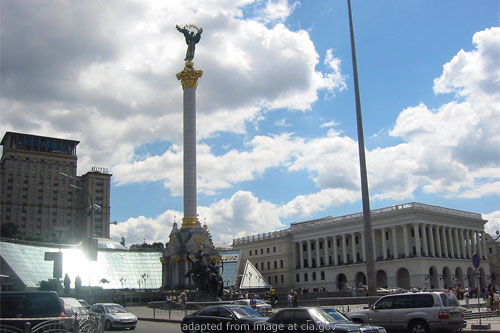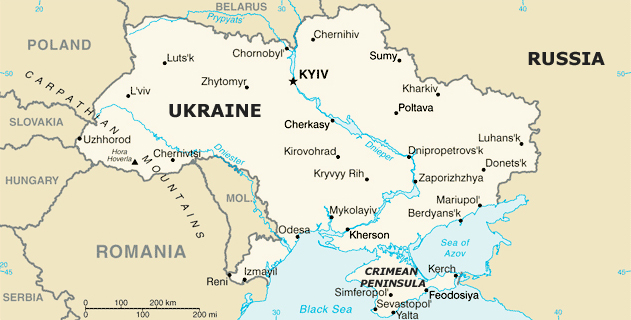Ukraine: Make Some of Russia’s Proposals Our Own

Subject: The West should make some of Russia’s proposals our own
Date: Mon, 31 Mar 2014
From: Anatol Lieven <anatol.lieven@kcl.ac.uk>
Ukraine: Make Some of Russia’s Proposals Our Own
By Anatol Lieven
Anatol Lieven is a professor in the War Studies Department of King’s College London and a senior fellow of the New America Foundation. He is author of Ukraine and Russia: A Fraternal Rivalry.
An ethnically-divided country in central Africa has experienced a revolution in which the elected government has been overthrown. A new government has been formed including in key positions representatives of extreme ethnic nationalist parties.
In previous speeches and publications their leaders have expressed strongly hostile attitudes towards national minorities. Their volunteer groups have taken an often menacing stance, including the beating and forced resignation – on camera – of the chief of a television station. Moves have been proposed to reduce the status of minority languages.
The result has naturally been to increase the fears of the principal national minority. A large neighbouring state which believes it has a right and duty to defend this minority, and which also has ambitions to keep its smaller neighbour in its orbit, is encouraging these fears to further its agenda. It has already seized and annexed a province which used to be part of its own territory, and has suggested the possibility of further military action. There is a growing risk that armed ultra-nationalist militias and those claiming to represent the minority will come into conflict.
In response the West, through the United Nations, puts forward a political settlement intended to restore legitimate democratic government, prevent civil war and deprive the neighbouring state of any pretext for further aggression.
The chief elements of this Western proposal are the following: constitutional guarantees for the status of minority languages; the creation of a federal system with elected regional governments to ensure the rights of local populations; the exclusion of ultra-nationalist forces from government; the placing of the defence and interior ministries under neutral control; and new presidential elections under international supervision, to be recognized by all the neighbouring countries. The West makes its aid to the country concerned conditional on its government’s agreement to this settlement.
All of this is such a normal way of trying to prevent conflicts, and is so completely in accordance with Western values, that these proposals have full support from Western political, media and policymakers.
Except of course that on this occasion, the country concerned is Ukraine. And the proposals that I have outlined have on this occasion come not from the West but from Russia. Nonetheless, whoever they come from, they do in fact fully correspond to western democratic values and commitment to minority rights.
The point about Western values applies with particular force to the exclusion of the extreme nationalist Svoboda party from government, in which Svoboda now holds five ministries, including Justice and the leadership of the National Security and Defence Council. In a passage which has been strangely absent from most western media reporting of this issue, the European Parliament passed the following resolution concerning Svoboda on December 13th 2012:
“Members of the European Parliament voice concerns about the rising nationalistic sentiment in Ukraine which led to the election of the “Svoboda” Party to the Parliament of Ukraine. The EP recalls that racist, anti-Semitic and xenophobic views go against the EU’s fundamental values and principles and it appeals to pro-democratic parties in the Ukrainian Parliament not to associate with, endorse or form coalitions with this party.” (“Elections failed to Bring Ukraine Closer to EU, Say MEPs”, at www.europarl.europa.eu).
When, how, and with what justification did a government including this party become a worthy recipient of huge amounts of European Union aid?
It is true that other Russian proposals are more problematical. For the West formally to recognize the illegal Russian annexation of Crimea is clearly out of the question. Practically however, Western officials know very well that now Russia has formally incorporated Crimea, there can be no getting it back except through a war between the USA and Russia. Most Western countries have after all never legally recognized the Turkish separation of Northern Cyprus or the Indian annexation of Kashmir, but few today remember this.
Another Russian demand is that Ukraine guarantee not to join either NATO or a Russian-led military alliance. Such a promise is politically difficult for the West, but in moral and practical terms should be extremely welcome. The USA and its allies have now demonstrated twice (first in Georgia in 2008) that there are no circumstances in which they will go to war in the lands of the former Soviet Union. To offer NATO membership to Ukraine is therefore the worst kind of strategic and moral irresponsibility. Far from strengthening NATO, it raises doubts about whether the alliance will even fight to defend existing members.
There can therefore be no serious moral or political objection to the West making most of Russia’s proposals its own. We should do this soon, however, as with every week that passes without a settlement the risk increases that Ukrainian nationalist and Russian-backed militias will come into bloody conflict. If that happens, it may lead to war, global economic crisis, the humiliation of the West, the isolation and decay of Russia, and the destruction of Ukraine.

